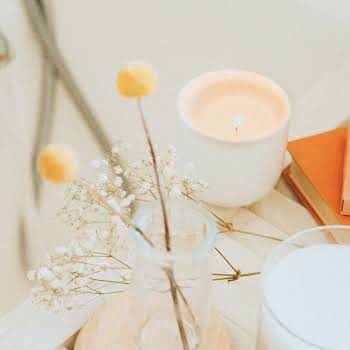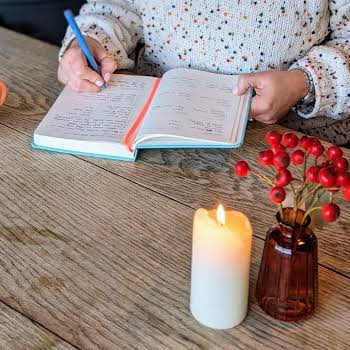A beginner’s guide to journaling: Everything you’ve ever wanted to know about the self-care ritual
By Sarah Finnan
12th Feb 2024
12th Feb 2024
Ever wondered what the true difference between journaling and keeping a diary is? Denise Kenny Byrne of The Head Plan breaks it down for us and, put simply: ‘Journaling puts you in the driver seat of life and keeping a diary puts you in the passenger seat of life’.
If the past few years have taught us anything, it’s the importance of taking a few moments out of our schedules to dedicate to ourselves.
We spoke to Denise Kenny Byrne, founder of The Head Plan Guided Journal and The Head Plan Community app – and the winner of Start-up of the Year at the IMAGE PwC Businesswoman of the Year Awards 2022 – about all things mindfulness and journaling. A wellness coach and certified meditation teacher, she’s passionate about incorporating balance and self-care into daily life; a change she believes we can all make, and quite easily too.

Having dappled in journaling on and off myself for the past few years, I was familiar with the basic idea behind the practice, but there were still a few things I wanted to know…
First off, how is journaling different from, say, keeping a diary?
I have kept a journal of sorts since the age of seven. Of course, I started with one of those furry diaries with a padlock on it in which I recorded my day but my methods have changed hugely in the last few years… as have my style in journals!
I feel keeping a diary is more reflective – looking back on the day gone and noting down what happened good or bad in the past tense. Keeping a journal is more looking forward – planning your day ahead and aligning yourself to actions that will make those good moments, achievements and goals happen.
Journaling puts you in the driver seat of life and keeping a diary puts you in the passenger seat of life.
Is it important to physically write out journal entries?
So important – in fact, I would go as far as to say it’s life-changing! I’ll be honest, it still blows my mind when I meet people and they say they don’t journal. Let me ask you this: What’s your goal in life? What’s your plan? Where do you want to go? Who do you want to be? As an avid journal-keeper, I can answer all of these questions but someone who does not journal won’t answer with certainty and unbeknownst to them, they may be in fact, caught up in someone else’s plan and just be aimlessly floating through life.
The physical act of taking a pen to paper – a place where you can not only record your goals and plans on how you’re going to get there but also somewhere you can reflect on achievements – is such a powerful practice. Journaling is the secret to getting clarity on what you really want in life and gives you that laser focus on what’s important. The simple act of writing down your goals and aligning your actions to them makes you 10 times more likely to achieve them.
You make it sound so easy… does it actually work?
There is science behind it for any sceptics out there! The act of writing out our goals activates the brain’s reticular activating system (RAS), the part responsible for sorting through what’s important, meaning when you get your goal on paper, your brain is literally trained to focus on it.
Freewriting, when we encounter a problem, is also known to help us problem solve and tackle limiting blocks that can hold us back from our best too. Journaling keeps me accountable, focused, motivated, inspired and driven to reach my goals and I know if you start, you will feel this soon too. It’s so empowering.
Ok, we’ve established the importance of putting pen to paper… where’s the best place to start if you’ve never journaled before?
The best thing about journaling, and one of the reasons I recommend it so much, is it’s so easy to start.
All you need is yourself, a pen and paper. You can start now – anytime, anywhere!
Now that we’ve got the basics, what are Denise’s top tips for getting into the rhythm of things?
- The first thing I advise is to make sure you have a beautiful space to write in. This actually helps a lot more than you might think. You feel motivated to write in something beautiful. Have your journal within view – on your bedside locker, the kitchen table – somewhere where you will see it.
- Leave time to plan for the day ahead. I am a huge believer in owning the day and not letting the day own you. With your weekly goals in mind, plan your day and assign yourself one main goal that you would like to achieve, followed by your tasks and actions. Tick them off one by one as you accomplish. This is so satisfying and, chances are, if you haven’t been in the habit of writing things down, you’re about to be surprised. You’re probably doing so much more than you know.
- Plan your week under six different headings: Finance, Business & Career, Personal Development & Learning, Self-Care & Wellness, Physical Environment, Friends & Family. These headings were adapted from a life coaching tool that aims to help people find balance. Too many times we focus solely on one area in a week and so many of us are guilty of this being business and career!
As for the best method to follow, Denise is a keen advocate for The Head Plan style of journaling – a method that relies on 15 minutes of journaling for the week ahead, followed by five minutes of journaling for the day ahead and then a short five-minute reflection at the end of the day.
I always advise people to start with a style of journaling that we call The Head Plan Method, this is the method that we introduced in our first journal. Our guided journaling practice is broken into sections from long and short-term goal discovery right down to weekly goals and your daily actions. So, in order not to overwhelm you, I suggest committing to at least one week – starting on a day of the week that suits you to plan for the week ahead.
At the end of the day, I reflect on my proudest moment that day. I practice gratitude, I ensure I have practised some form of self-care – even if it’s just making a cup of tea for five minutes of peace – and then I go again and plan for the following day.
We have a free download on The Head Plan website in which you can experience this method of journaling and try it for a week.
Should journaling be done at the same time every day?
Yes, I am very passionate about building positive habits, rituals and routines in order to bring the best version of myself to the day ahead. I journal every morning and evening at the same time.
Dedicating five minutes to journaling in the morning and evening will transform your day.
If we don’t commit to a set time, especially in the beginning, our journaling can be neglected. I advise building it into your morning and evening ritual.
Any advice for perfectionists (a.k.a me!) who find it hard to just sit down and write?
The beauty of journaling is there are no wrong answers… it’s your journal, your style, your words. If I could offer any advice, it would be to dedicate the time, commit to it, and just go for it. Once you start and you feel your productivity and positivity levels increase, it’s hard to stop. Nothing but good can come from starting a journal.
First launching The Head Plan in December 2019, Denise and her team have gone on to empower thousands of people in over 70 different countries to follow their lead and start journaling. The Head Plan Journal can be purchased online via their official website, on Amazon, or in-store at Arnotts and Brown Thomas.
This article was originally published in January 2022.























